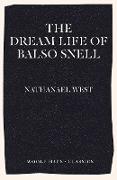- Start
- The Dream Life of Balso Snell
The Dream Life of Balso Snell
Angebote / Angebote:
The virtuoso performances of a sophisticated stylist ... compact, skilful, and hilarious." - Randall ReidAmerican modernist Nathanael West's first novel, The Dream Life of Balso Snell, is an anti-künstleroman, it's a portrait of a young artist discovering his powerlessness. The title character, a lyric poet, takes a nightmare tour through the bowels of the Trojan Horse, meeting a series of failed and frustrated writers along the way. Each surrealistic episode underscores the futility of the literary vocation and gleefully mocks the pipe dreams of amateurs who aspire to wealth and immortality. It was first published in 1931 in an edition of only 500 copies. "West's aesthetic sensibilities transform ugly material into a beautiful composition ... that, by its very artistry, celebrates that which it wishes to destroy" - Deborah Wyrick"[Balso] undertakes not just a disavowal of high modernism and the idealism of its art-for-art's sake aestheticism, but a critique of nothing less than the grand tradition of Western culture upon which it depends. That critique results in a thorough housecleaning, an operation that will dispense with everything from Plato to Picasso" - Jonathan Veitch'Beneath this gloom that [West] was pouring at you, there was a streak of the most diabolical humor, you couldn't imagine ...' - John Fante"Scenes of extraordinary power ... vividly drawn grotesques." - F. Scott Fitzgerald"By applying the magpie aesthetics of Surrealism and T.S. Eliot to the 'American Grain, ' by delving into the popular culture and emerging not with surrender or refusal but a razor-cool critique, West became the great precursor to Heller, Pynchon, Philip K. Dick, George Saunders, and so much else." -Jonathan Lethem"[West's] novels say more about the way we live now - and the things that brought us to our present pass - than any other work of fiction I can think of." - The New Yorker"Nathanael West's stunning four novels are American tales, rooted in our transmogrifying soil. Morality plays they are, classified as comedies. They are indeed often funny. Funny as a crutch." - Elizabeth Hardwick, The New York Review of BooksAbout the authorNathanael West published four novels during the thirty-six years of his life. The first, The Dream Life of Balso Snell, an experimental work written in the 1920s, was well-received but sales were poor. The second, the brilliant Miss Lonelyhearts, was published in 1933, a few months before his publisher went bankrupt. The third, A Cool Million, vanished into the depths of the Depression. It was at this point that West went to Hollywood to earn his living as a scriptwriter. From his Hollywood experience came The Day of the Locust. Publishing in 1939, the novel received very little recognition. The following year, on December 22nd, the day after his neighbour F. Scott Fitzgerald died of a heart attack, Nathanael West and his wife were killed in a California highway accident. When West died, at the age of thirty-seven, his originality and brilliance were little known outside an intensely admiring circle of fellow writers: William Carlos Williams, Edmund Wilson, S. J. Perelman, and others. Not until West's four novels were reissued in the late 1950s was he acknowledged as one of the most gifted writers of his generation. His masterpieces blend manic farce and despairing compassion, and their vision of an America awash in its own mass-produced fantasies, read like a prophecy of much that was to come in American literature and life.
Folgt in ca. 5 Arbeitstagen
